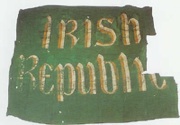
By Jim Gibney (for Irish News)
Next Monday marks the 93rd anniversary of the 1916 Rising. This Sunday republicans from many different backgrounds across this island and the world will commemorate the rising and pay homage to those who died in Easter Week and since for the freedom and reunification of this country.
The rising was not only a momentous occasion in the long struggle by the people of Ireland for independence but was a turning point in that journey towards a national democracy.
Out of the embers of a destroyed GPO in Dublin’s O’Connell Street the headquarters of the republican army - a national movement, which united all the classes seeking independence, emerged.
The 1916 Rising was the end product of more than a century of protest, largely peaceful, since the brutal suppression by the British government of the 1798 Rebellion.
Nineteenth century Ireland featured Robert Emmet’s armed rising, Daniel O’Connell’s mass movement, the Young Irelanders and the 1848 revolution; the Land League, the Fenians’ revolt and the Home Rule movement of Parnell and Redmond.
Whether peaceful or armed the British government ignored the demands for change and by the beginning of the 20th century the scene was set for a rising which defined the future governance of Ireland for republicans as a Republic.
Two symbolic emblems carried the objective of that republic - the Irish national flag and the 1916 Proclamation.
The tri-colour flew over Dublin’s GPO for the entire week of the rising. Its colours represented the two main traditions, nationalist and unionist with a strip of white uniting them in peaceful co-existence.
The 1916 Proclamation set out the vision, the quality of life for those who would live in the republic as free men and women - a republic which men and women were to die for.
The principles of the Proclamation have influenced and guided those republicans who carried the struggle forward for a republic to this day - the people of Ireland are sovereign; it is their writ that should run across Ireland, not Britain’s in part of it; society should be so organised to ensure the people have ‘ownership’ of it, a stake in it; “religious and civil liberty, equal rights and equal opportunities” guaranteed to all citizens and this included the right to vote for women, which was denied to them.
The Proclamation was recognised at the time and since as a revolutionary document seeking a society based on a national democracy with equality and social justice for all its citizens.
The Proclamation’s democratic credentials were reflected in its commitment to a republic where the people are sovereign whereas across Europe monarchies reigned over people with few rights.
The national movement and the war of independence which followed the rising foundered in the face of partition and a disastrous civil war.
The republic was betrayed by some of those leaders who survived the conflict between 1916-23. They built a state in the 26 counties, called it a republic and ignored the plight of nationalists trapped in the six counties and treated by unionists as second-class citizens in their own country.
It was left to a small but incredibly brave group of republicans to carry the beacon of freedom - the ideal of the 1916 republic - decade upon decade until the popular nationalist revolt of 1969.
That tidal wave of anger regenerated and reinvigorated the modern republican movement. That mood carried the republican struggle through many phases over the last 40 years.
The Ireland that Padraig Pearse, James Connolly and Countess Markiewicz faced was similar to the one faced by Gerry Adams, Martin McGuinness and Mairead Farrell - an Ireland in the armed vice of a ruthless British government.
That Ireland no longer exists.
We live in a country with novel political institutions arising from the Good Friday Agreement. These institutions are evolving and expanding their democratic legitimacy as they tackle the legacy of partition and Britain’s unwelcome involvement in Irish affairs.
None of this would have happened had republicans not remained focused on the struggle for a republic.
And that is the sure guarantee that an independent republic will be achieved.
Only now, the methods rely on the force of argument and not the argument of force.
![[Irish Republican News]](https://republican-news.org/graphics/title_gifs/rn.gif)
![[Irish Republican News]](https://republican-news.org/graphics/title_gifs/harp.gif)

